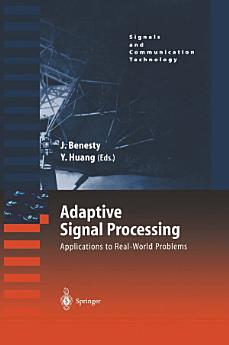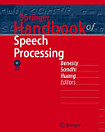Adaptive Signal Processing: Applications to Real-World Problems
Jacob Benesty · Yiteng Huang
Mar 2013 · Springer Science & Business Media
Ebook
356
Pages
reportRatings and reviews aren’t verified Learn More
About this ebook
By adaptive signal processing, we mean, in general, adaptive ?ltering.In- known environments where we need to model, identify, or track time-varying channels, adaptive ?ltering has been proven to be an e?ective and powerful tool. As a result, this tool is now in use in many di?erent ?elds. Since the invention, by Widrow and Ho? in 1959, of one of the ?rst ad- tive ?lters, the so-called least-mean-square, many applications appeared to have the potential to use this fundamental concept. While the number of - plications (using adaptive algorithms) has been (and keeps) ?ourishing with time, thanks to several successes, the need for more sophisticated adaptive algorithms became obvious as real-world problems are more complex and more demanding. Even though the theory of adaptive ?ltering is already a well-established topic in signal processing, new and improved concepts are discovered every year by researchers. Some of these recent approaches are discussed in this book. The goal of this book is to provide, for the ?rst time, a reference to the hottest real-world applications where adaptive ?ltering techniques play an important role. To do so, we invited top researchers in di?erent ?elds to c- tribute chapters addressing their speci?c topic of study. Thousands of pages wouldprobablynotbe enoughto describeallthe practicalapplicationsutil- ing adaptive algorithms. Therefore, we limited the topics to some important applications in acoustics, speech, wireless, and networking, where research is still very active and open.
Rate this ebook
Tell us what you think.
Reading information
Smartphones and tablets
Install the Google Play Books app for Android and iPad/iPhone. It syncs automatically with your account and allows you to read online or offline wherever you are.
Laptops and computers
You can listen to audiobooks purchased on Google Play using your computer's web browser.
eReaders and other devices
To read on e-ink devices like Kobo eReaders, you'll need to download a file and transfer it to your device. Follow the detailed Help Center instructions to transfer the files to supported eReaders.




